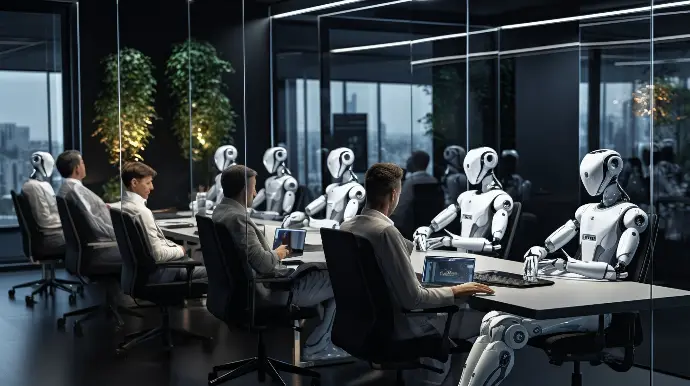Artificial intelligence could affect the labor market, why?
Artificial intelligence could displace between 400 and 800 million jobs globally by 2030

Artificial intelligence (AI) has surpassed our intelligence. Thanks to history, we know that great technological innovations have changed how we interact with the world and what our reality is like. AI is set to be the next disruptive technology and the question is how will it transform our world?
Starting with its definition, AI are computational systems capable of performing tasks that would traditionally be done by the human intellect: recognizing objects, solving problems and learning. In 1950, the test by the English mathematician Alan Turing already suggested that when a machine could make another person think that they were human, it could be said that they were intelligent. Decades later, great advances would be made where the machine would show its capabilities, beating the world champion in chess, serving as a virtual assistant or creating images from words given by the user. However, recent developments promise to be a watershed between the present as we know it and the future as we imagine it.
One intelligence that has stood out is ChatGPT3, founded by OpenAI. It has surprised with its ability to generate solutions in seconds to any user demand; it is capable of writing programming code, writing essays, composing poems (whether what an AI generates can be considered art will be up to critics), creating cooking recipes and more, subject to the user's imagination. Since its launch in November 2022 until February, it has registered 100 million users, reaching the first million in five days. In comparison, the iPhone took 74 and Facebook 304 days to reach its first million.
What stands out about AI is that the more information you feed it, the better it will learn and give better results. ChatGPT3 was trained on 45 terabytes of information, which would be equivalent to reading 15 million 300-page books, and its next update is believed to make it 500 times more powerful and with fewer errors, devouring entire libraries and putting its knowledge at your fingertips.
The strength of AI lies in learning faster than humans. The arrival of what is known as Big Data means that AI will be able to feed on unimaginable amounts of data, which will increase its “intelligence” and its ability to create content and make decisions in real time. What does this mean?
More immediately, AI will affect the labor market. The consulting firm McKinsey estimates that it could displace between 400 and 800 million jobs globally by 2030 and will create new jobs (although it will possibly create fewer jobs than it destroys), demanding new types of skills in the labor market.
People will have to learn to work with AI, as it will be able to diagnose and operate more accurately than a doctor, know the laws better than a lawyer, and have other cognitive and manual skills.
In the future, it will force the State and citizens to rethink several parameters of their daily lives; the paradigm of educational development, the efficiency of transportation, among other issues. The State will have to mitigate the shocks of this disruption.
Unemployment will increase and it will be difficult to incorporate a segment of the population into the labor market, so policies that ensure a minimum level of quality of life will be needed, bringing to debate how income and wealth should be distributed in a country.
Additionally, AI will raise moral and ethical dilemmas that will generate discussion, many of which will have to do with issues of privacy, misinformation, manipulation, transparency, and the ethical code that should govern this intelligence, which will test our criteria to decide between what is true and what is false, what is right and what is wrong.
Meanwhile, the private sector is not slow to act. Microsoft and Google, the big tech companies, are looking to get ahead. The former will invest 10 billion dollars in OpenAI, to improve its products such as: its search services (Bing), its cloud computing infrastructure (Azure) and its work team platform (Microsoft Teams). To counter this, Google introduced Bard at its conference on February 8, 2023, seeking to calm the public.
The tragedy was that its AI made a mistake during the demonstration and the share price of Alphabet (Google's parent company) plummeted by 7%, erasing 100 billion dollars of its market value in a matter of seconds, a symptom of an excessive fury of investors that could become a bubble in the future, similar to the technological bubble of 2001.

 IHRO NEWS
IHRO NEWS